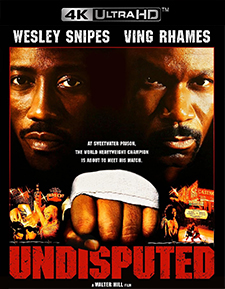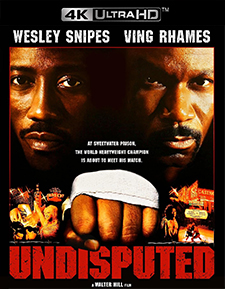Undisputed (4K UHD Review)

Director
Walter HillRelease Date(s)
2002 (August 26, 2025)Studio(s)
Miramax Films (Kino Lorber Studio Classics)- Film/Program Grade: B-
- Video Grade: B+
- Audio Grade: B+
- Extras Grade: B
Review
Walter Hill made his directorial debut in 1975 with Hard Times, a sports film about a bare-knuckled brawler fighting his was across Depression era Louisiana. Despite some offscreen conflicts with lead actor Charles Bronson, the film was successful, securing Hill’s reputation as a no-nonsense filmmaker and setting the template for many of his films that followed (especially in terms of the relationship between a laconic hero and his garrulous sidekick). Unfortunately, despite the fact that films like The Warriors and 48 Hours were also hits, Hill has frequently fallen on hard times of his own. The Nineties were particularly tough for him, and while the sequel Another 48 Hours did well despite some more behind-the-scenes conflicts, Trespass, Geronimo: An American Legend, Wild Bill, and Last Man Standing all flopped. By the turn of the century, he suffered even greater indignity when his science fiction epic Supernova was taken away from him, reshot, and recut—and the resulting mess flopped even harder. That put Hill at something of a crossroads (no pun intended), so it’s not surprising that that he ended up returning to the genre that had started it all for him with Undisputed.
Hard Times had centered around illegal underground boxing, but while the rest of Hill’s filmography has featured plenty of hand-to-hand combat, he had never directly addressed the world of professional boxing until Undisputed. Which he did, but with a twist: it’s the story of a professional boxer who’s sent to prison and ends up finding himself roped into the world of underground prison boxing. George “The Iceman” Chambers (Ving Rhames) is a heavyweight champion who has been convicted of rape and sentenced to serve his time at Sweetwater Prison, where he decides that the only way to survive is to pick fights with everyone from the other convicts to the prison staff. That includes the local boxing champion Monroe Hutchen (Wesley Snipes), leading to a golden opportunity for convicted mob boss and fight fan Mendy Ripstein (Peter Falk), who sets up a high-stake match between the two where only one man can be left standing, as Monroe acknowledges:
“He’s a fighter, I’m a fighter, if I’m better on that day, I win. That’s just the way it goes. Someday, every fighter loses. Sooner or later, somebody comes along and they got your ticket. Too old, just wasn’t your day, whatever the reason is. In the end, everybody gets beaten. The most you can hope for is that you stay on top a while. Be the best.”
The Iceman is convinced that he’s the best, of course, and he’s got the belts to prove it, but in the end, everybody gets beaten. There’s a lot more to Undisputed than that, including Iceman’s (and Mendy’s) dealing with the prison warden (Denis Andt), Iceman’s relationship with his cellmate Mingo (Wes Studi), Monroe’s relationship with his toady Ratbag (Fisher Stevens), and Mendy’s surprisingly affecting relationship with his assistant Chuy (John Seda). Oh, and there’s a suitably sadistic prison guard in the form of the inimitable Michael Rooker, too. Plenty of prison politics, a double cross or two, and some digs at media exploitation of both the accuser and the accused in televised rape cases. Yet at its heart, Undisputed is really about nothing more than the mano a mano between Iceman and Monroe, with everything else serving as window dressing.
That’s exactly the kind of story that Walter Hill has always been able to tell with ruthless efficiency, but Undisputed being a late-period Hill film, it’s filled with a bit more window dressing in terms of the multimedia style that he had started to explore in films like Trespass and Wild Bill. The editing is hyperkinetic, which works well enough for most of the film but gets in the way during the final fight. There’s probably more cutting in Undisputed than in any other Hill film save perhaps for Streets of Fire, and while that style worked perfectly for the rhythmic nature of the fights in that film, it takes away from the impact of the final fight here. Rhames and Snipes were both in top condition, and they did all of their own fighting and stunt work, but the nature of the editing makes it difficult to tell. (Rhames had been training for a Sonny Liston project that fell apart, although he returned to the role a few years later in Robert Townsend’s The Phantom Punch).
Still, Hill’s script (co-written with his longtime partner David Giler) sticks to the kind of masculine basics at which he’s always excelled, and he didn’t feel the need to sugar coat things, either. Undisputed is a story without heroes where everyone deserves to be exactly where they have found themselves. While Hill never settles the matter of Iceman’s actual responsibility in terms of the rape accusations (Hill ultimately takes a bit of a “both sides” approach), it’s clear that Iceman is an egotistical man who’s perfectly willing to use his fists to settle disputes, even ones that are his own fault. Monroe, on the other hand, is a complete enigma, making it possible to root for either one of them. Yet the outcome is never really in doubt, because as Hill has noted, Undisputed is a “dog bites man” story, not man bites dog, so one of them had to lose.
Undisputed didn’t exactly end Hill’s losing streak at the box office, but a funny thing happened on the way to cinematic obscurity. Hill has always been a cult filmmaker whose work gains in reputation over the years regardless of box office success or failure, but Undisputed did something genuinely unexpected: it became a franchise. Three direct-to-video sequels have followed (with a fourth reportedly on its way), and while none of the original cast or crew participated in any of them, they’ve kept Undisputed alive long past what could have been its expiration date. Hard times or not, Hill has ended up having the last laugh.
Cinematographer Lloyd Ahern II shot Undisputed on 35mm film (in Super-35 format) using Panavision cameras with spherical lenses, framing for anamorphic release prints at 2.39:1. This version is based on a 4K scan of the original camera negative, cleaned up and graded for High Dynamic Range in Dolby Vision and HDR10. “Original camera negative” is a somewhat loose term in this case, because the multimedia nature of the film means that there’s a substantial quantity of dupe internegative footage cut into the camera negative. Undisputed is loaded with opticals like dissolves, fades, freeze frames, desaturated color, multiple exposures, and even video transferred to film. Even when there’s raw negative footage involved, Ahern utilized diffusion, smoke, and he frequently shot through glass. Put all of that together, and we’re talking about a film that’s never going to look as sharp and detailed as what the best of the format can offer. The grain is moderately heavy, too. HDR does help, enhancing the contrast range and given an already stark film an even starker look. Undisputed isn’t necessarily a looker in 4K, but it looks exactly like it should.
Audio is offered in English 5.1 and 2.0 DTS-HD Master Audio, with optional English subtitles. There’s some real dynamic impact when appropriate, but it’s still a somewhat basic 5.1 mix with light ambient effects like crows noises in the surrounds, but not a ton of directionality. There’s some decent bass, though, especially in the score by jazz legend Stanley Clarke and the various pieces of source music that are used throughout the film.
The Kino Lorber 4K Ultra HD release of Undisputed is a two-disc set that includes a Blu-ray with a 1080p copy of the film. There’s also a slipcover that duplicates the theatrical poster artwork on the insert. The following extras are included:
DISC ONE: UHD
- Commentary by Mike Leeder and Matt Routledge
DISC TWO: BD
- Commentary by Mike Leeder and Matt Routledge
- Personal Combat: Interview with Walter Hill (HD – 22:32)
- A Conversation with Wesley Snipes (SD – 4:39)
- A Conversation with Ving Rhames (SD – 2:48)
- Trailer (HD – 2:22)
- Jungle Fever Trailer (SD – 2:37)
- Out of Sight Trailer (HD – 2:35)
- The Long Riders Trailer (HD – 2:28)
- Johnny Handsome Trailer (HD – 1:31)
The new commentary features action movie expert Mike Leeder and martial arts filmmaker Matt Routledge, both of whom launch into Undisputed with their usual unbridled enthusiasm. They note that the film was produced during a time of change, when the popularity of boxing was shifting to MMA, and many theatrical releases were shifting to home video instead (something that affected the sequels). From there, they launch into an extensive filmography of Walter Hill, all the way up to the implosion of Supernova that led to him stepping back into smaller projects like Undisputed. They also dive into the careers of Wesley Snipes and Ving Rhames as well, meaning that this really isn’t a scene-specific commentary since they spend so much time on background that they’re halfway through before they finally start talking about Undisputed. That’s not a bad thing, though, since it’s all pretty interesting even to a Walter Hill devotee like me.
Personal Combat is a new six-part interview with Hill, who says that boxing is a primal activity that lets us know where we come from more than any other sport. He wanted Undisputed to be very elemental and pure, focusing on the personal combat and not getting sidetracked by other prison stories. Hill discusses the conception of the story, the casting, the production itself, and the editorial process. He also gives his thoughts about the distribution of the film, including some candid thoughts about dealing with Harvey Weinstein at Miramax. Hill said “no” to all of Weinstein’s suggestions, which doubtless affected the amount of effort that Miramax put into promoting it. (Hill is equally candid when talking about casting Michael Rooker despite the fact that the actor had previously bailed on Streets of Fire). It’s a great interview.
Kino has also included two archival interviews with Wesley Snipes and Ving Rhames that look like they were conducted for the electronic press kit. Snipes talks about how he was cast for the film (reinforcing the story that Hill tells in his own interview) and shares some of his experiences making it. Rhames talks about his own casting, including the training that he had been doing for the aborted Sonny Liston project, and he emphasizes that while Undisputed is a movie with boxing in it, it’s not really a boxing movie. It’s all about the men, regardless of genre.
Undisputed was an unlikely film to launch a franchise, which is perfectly appropriate since it’s been an unlikely franchise. The original still stands above the rest, and while it may fall short of the greatness of other Walter Hill classics, it’s still essential viewing for fans of the director. No, it’s not a massive upgrade in 4K, but this is the best version of the film currently available, so it’s still recommended for fans of Hill and/or Undisputed.
-Stephen Bjork
(You can follow Stephen on social media at these links: Twitter, Facebook, BlueSky, and Letterboxd).

